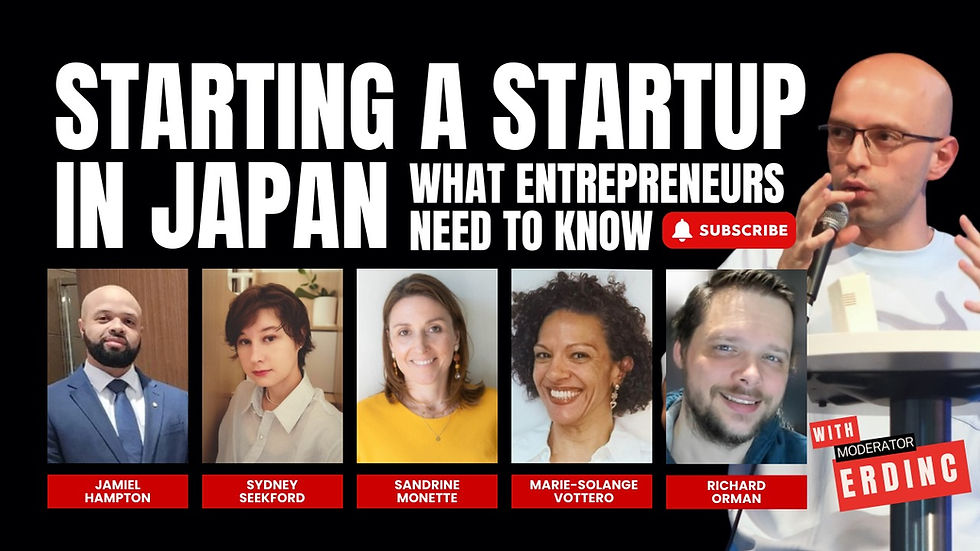Starting a Startup in Japan, what every Entrepreneur needs to know
- Aug 14, 2025
- 3 min read
Starting a company in Japan isn’t just about filling out forms and perfecting your pitch deck; it’s about trust, timing, and really understanding how business is done here.
That’s why I hosted this session, “Starting a Startup in Japan: What Every Entrepreneur Needs to Know,” bringing together five incredible founders “Richard Orman, Jamiel Hampton, Sandrine Monette Hubert, Sydney Seekford, and Marie-Solange, to share their real life experiences of building companies in one of the world’s most unique startup markets.

As Managing Director of the Founder Institute in Japan, Korea, and Taiwan, and CEO of Openfor.Co, I’ve seen how Japan can challenge even the most seasoned entrepreneurs. But I’ve also seen how, with the right approach, it can be a reward for founders with opportunities you won’t find anywhere else.
📺 Watch the full video here-
1. It’s Hard, But Possible
Every founder on stage talked about the same early headaches: opening a bank account, figuring out the paperwork, finding the right lawyer, and dealing with the dreaded “silent rejection” where people just stop replying.
The turning point came when they leaned on local contacts, kept showing up, and accepted that things take longer here. With time, those closed doors started to open.
Key Points:
Bureaucracy and systems can feel slow at first, but plan for it.
Having local allies makes all the difference.
Persistence pays off more than any clever shortcut.
2. Japan Doesn’t Do Cold Pitches
In Japan, business starts with relationships, not transactions. You can’t expect to meet someone once, pitch, and get a deal. Instead, you need to keep showing up, having conversations, and building familiarity before you even talk numbers.
Key Points:
Meet people more than once before expecting any deal talk.
Being part of the community builds trust faster than cold outreach.
Relationships open doors that emails won’t.
3. Moving Slow Isn’t Failure
Several founders hit what they called “the wall,” where progress seemed to stop. Instead of forcing a sprint, they need to slow down, learned more about the market, and build stronger foundations. In Japan, patience is part of the process, not a sign you’re falling behind.
Key Points:
Slowing down can be strategic, not a setback.
The market rewards those who take time to understand it.
Sometimes the pause leads to bigger wins later.
4. Building When You Can’t Fit In
For outsiders, non-Japanese speakers, or anyone who doesn’t follow the usual career path, opportunities can feel limited. The founders here didn’t wait for permission; they built businesses around their own skills, ideas, and experiences, creating a path that worked for them.
Key Points:
Don’t wait for the “perfect” opportunity; instead, make one.
Your perspective as an outsider can be your advantage.
Start small, but start. Momentum matters.
5. Mission-First Building
These founders weren’t just chasing profit. They were solving problems they cared about deeply, whether that meant helping workers, reshaping culture, or connecting Japan with the rest of the world. That mission made it easier to attract partners, customers, and team members who shared their vision.
Key Points:
A clear mission keeps you going when things get tough.
Purpose attracts the right people and opportunities.
Mission-driven companies often build stronger communities around them.
Final Thoughts for Aspiring Founders in Japan
Building in Japan isn’t about hacking your way to quick wins, but it’s about laying foundations that last.
If you’re thinking about starting up here, remember:
✅ Relationships before transactions, trust opens doors money can’t.
✅ Patience is progress. It may be slow, but it pays off.
✅ Use your unique perspective. It’s your edge.
✅ Lead with purpose. It resonates more than a feature list.
A Big Thank You
A huge thank you to Richard Orman, Jamiel Hampton, Sandrine Monette-Hubert, Sydney Seekford, and Marie Solange for sharing their journeys and practical advice.
Their stories prove that while starting a business in Japan is never simple but it’s still possible, and for those willing to adapt, listen, and lead with purpose, the opportunities are endless.
#StartupInJapan #FounderLife #Openforco #JapanStartups #GlobalFounders #BuildingInJapan #FIJapan #FIKorea #FITaiwan #cocapital #WomensLeadership #ExpatFounders #StartupStories



Comments